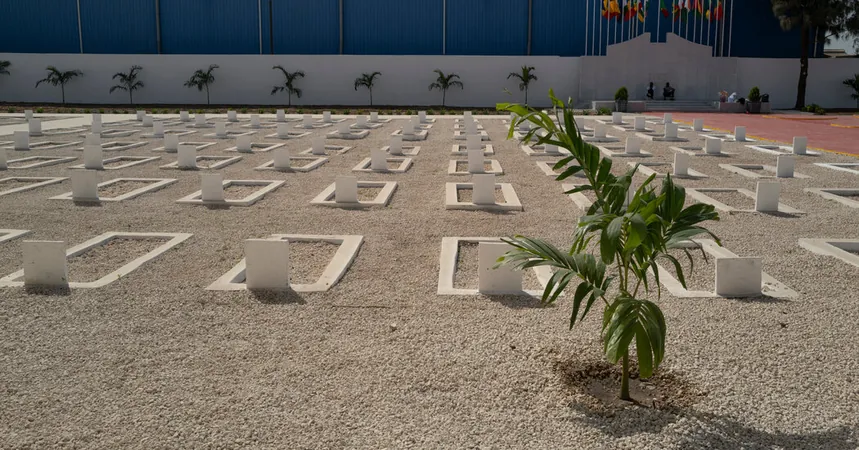
80 Years Later: Senegal Demands Truth from France on the Thiaroye Massacre
2024-12-01
Author: Wei
Introduction
In a poignant classroom in Thiaroye, Senegal, students sat attentively, absorbing a powerful history lesson delivered by their teacher, Aminata Diedhiou. What unfolded next was a deep dive into the tragic events of December 1, 1944, when French colonial troops executed hundreds of West African soldiers returning from World War II.
As Ms. Diedhiou recounted the atrocities, students grappled with their questions: Why did the French massacre them? What were the circumstances of the killings? Sixteen-year-old Amy Sall's yearning for knowledge resonated with a broader national sentiment: Senegal seeks the truth.
As the 80th anniversary of the Thiaroye Massacre approaches, the Senegalese government is intensifying its calls for France to provide a complete account of this dark chapter in colonial history. Recent statements from French President Emmanuel Macron marking the event as a “massacre” are seen as a significant shift, yet President Bassirou Diomaye Faye's response was clear— 'That is not enough.' The quest for an accurate death toll, a clear understanding of the massacre's motives, and the whereabouts of the victims’ remains remains urgent.
Historian Mamadou Diouf, now at the helm of a research committee for the Senegalese government, emphasized that addressing Thiaroye could galvanize Pan-African unity, invoking a shared consciousness amongst nations mourning similar losses. This renewed thrust for accountability signifies a shift in Senegal's approach towards its former colonizer— a resolute assertion of sovereignty.
The Massacre in Cold Blood
On that tragic morning, hundreds of West African men, who had valiantly fought for France, gathered at Thiaroye, expecting to return home. Instead, as tensions rose over delayed compensations, French officers were ordered to “restore order.” What followed was a rapid barrage of gunfire, resulting in an official figure of 35 dead. However, deep-dive investigations suggest that the actual count may near 400, with historians asserting that the soldiers were unarmed and the incident appeared premeditated.
“The French narrative is incomplete. We must establish our own history,” Diouf remarked, stressing the importance of uncovering suppressed documents.
Remembering Thiaroye
While much about December 1, 1944, is still shrouded in mystery, the memory of Thiaroye is alive in Senegalese culture—echoing through plays, poetry, and music. The film "Camp de Thiaroye," directed by Ousmane Sembène, remains a cultural touchstone that continues to educate and provoke thought.
The current Senegalese government is making a conscious effort to elevate this historical event into the political arena. Billboards announcing the 80th anniversary decorate the streets of Dakar, and renovations are underway at a military cemetery in Thiaroye in anticipation of the official commemoration ceremony.
This remembrance is particularly poignant for students in Ms. Diedhiou's class. Each year, they honor those killed on school grounds, wearing uniforms that echo the past. Seventeen-year-old Awa Samateh articulated their collective sentiment: “We are proud to pay tribute, but it pains us deeply that they were killed without reason.”
A Shift in Relations with France
Historically, Senegal’s relationship with France has been characterized by diplomacy that often avoided confronting the past. However, the current government is breaking that pattern, urging transparency and accountability for colonial atrocities. “Previous leaders felt they had to plead with France for acknowledgment,” said writer Boubacar Boris Diop. “Now, we see a change.”
As archival research intensifies, Senegalese officials are hopeful that new insights will emerge, potentially affecting calls for reparations. While France has insisted it has been forthright with its records, sentiments from Senegal maintain otherwise, noting that many crucial documents might still be concealed.
“This quest for truth is essential for healing and forging a future partnership devoid of past shadows,” stated President Faye, who also called for the gradual removal of French troops stationed in Senegal.
The legacy of the Thiaroye Massacre is not just a historical footnote for the members of Senegalese society; it profoundly influences their current relations with France and shapes their national identity. As the memorial approaches, many wonder if the French government will indeed take the opportunity to right the historical wrongs that have stood for generations.




 Brasil (PT)
Brasil (PT)
 Canada (EN)
Canada (EN)
 Chile (ES)
Chile (ES)
 España (ES)
España (ES)
 France (FR)
France (FR)
 Hong Kong (EN)
Hong Kong (EN)
 Italia (IT)
Italia (IT)
 日本 (JA)
日本 (JA)
 Magyarország (HU)
Magyarország (HU)
 Norge (NO)
Norge (NO)
 Polska (PL)
Polska (PL)
 Schweiz (DE)
Schweiz (DE)
 Singapore (EN)
Singapore (EN)
 Sverige (SV)
Sverige (SV)
 Suomi (FI)
Suomi (FI)
 Türkiye (TR)
Türkiye (TR)